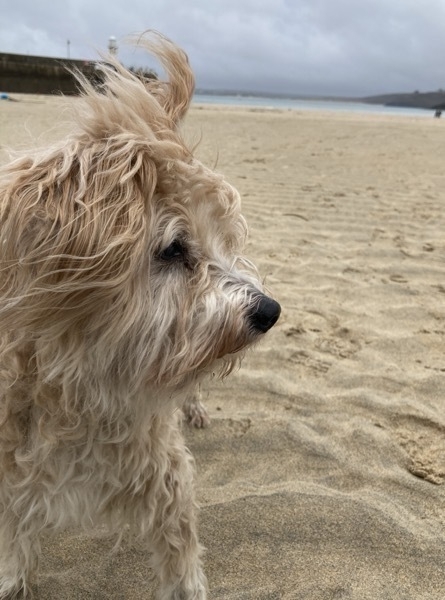
This week we said good bye to Bill, our dog and companion for nearly 17 years. I talked about him in the latest episode of Mid-faith Crisis, in an episode which proved to be rather emotional for both Joe and myself.
This is a kind of tidied up version of what I said on the show.
It’s been a strange and sad week. Very blessed in many ways but incredibly sad. A lot of happy memories mixed with grief and loss.
I’ve been trying to think about how to talk about it. Or even whether to talk about it at all. Because I don’t want to reduce Bill to some kind of sermon. He was more than some kind of moral lesson or anecdote. He was a unique being with likes and dislikes. He had a personality, therefore he had some kind of personhood. Which makes you wonder: why do we assume that only human beings have a soul? Vegetarians might see this as a strong argument. They have a point. All I can say is that there may well be a clash between my theology and my cookery.
But leaving that aside, as I’ve been thinking about him, and grieving him, there are things that I believe dogs in general, and Bill in particular, has taught me.
Dogs don’t pretend. They don’t disguise their feelings. Bill loved us and he never hid that. I saw two dogs being walked yesterday and their tails were going like the clappers; they were so happy, so unashamedly joyful. I don’t think dogs care about being cool. Cats are cool. Dogs are just so happy to see you. Being reserved could never have entered Bill’s head. Which might be a good lesson for me to learn. I’m English, so a certain level of reservation and detachment is woven into the DNA. But joy should be expressed.
Dogs know what it is to be joyful. And they take joy in simple things. Dogs love routine and repetition. They take joy in doing the same things over and over. Bill loved routine. He knew when it was time for his treats, time for a walk. Dogs can take delight in the same things over and over again. Some dogs, once you start throwing the ball, they will go at it for hours. Bill, frankly, was rubbish at a lot of basic dog activities: he was hopeless at chasing sticks and I never once saw him catch a ball. He couldn’t swim and avoided water. But he loved running in circles in the park. He loved going in the car. He loved walks, up until recently at any rate. And he loved chips. In the village where we used to live, if you let him guide you he would take you to the same places, most notably, the chip shop.
I think we lose this love of simple, repeated pleasures. The world is always trying to sell us something new. It reminded me of this quote by G.K. Chesterton:
“Because children have abounding vitality, because they are in spirit fierce and free, therefore they want things repeated and unchanged. They always say, “Do it again”; and the grown-up person does it again until he is nearly dead. For grown-up people are not strong enough to exult in monotony. But perhaps God is strong enough to exult in monotony. It is possible that God says every morning, “Do it again” to the sun; and every evening, “Do it again” to the moon. It may not be automatic necessity that makes all daisies alike; it may be that God makes every daisy separately, but has never got tired of making them. It may be that He has the eternal appetite of infancy; for we have sinned and grown old, and our Father is younger than we.”
Dogs exult in monotony. We think monotony is the eighth deadly sin. But it is good to take joy in repetition, and to repeatedly enjoy things and places which are good in and of themselves. The world is always trying to sell us new things: new experiences, new places, new, upgraded models. It’s not that these are unimportant, but maybe they dull us to the joyful delight that surrounds us everyday. Perhaps the biggest, most important thing in our life, is not the treats or the special moments. It’s the everyday things; the monotonously good life.

Above all, Bill loved us. He taught me that love is presence. He loved us and he loved being with us. He loved being with my wife, especially, but if she wasn’t around he would settle for one of the rest of us. Mainly, though, he would spend most of his days sitting in his chair in Claire’s office. That was all he wanted and all he needed. Being with us was his happy place.
We complicate everything with tasks. And with rules. With ways of being. Prayer, for example. Prayer is, ultimately, being conscious of God’s presence. Being aware. For Bill sometimes that meant walks. But mostly he was happy just sitting with us, in his chair. I have a new definition of prayer: it’s sitting curled up on a chair in the same room as God.
Separation was his biggest fear. The day we moved he disappeared and I found him sitting in the passenger seat of the car and he wouldn’t move. He was not getting out of there. He knew that if he stayed there he would be going with us. That’s a fear that resonates with most of us, I assume. We fear being abandoned, being left behind. Perhaps we think other people are in God’s room and we’re outside in the kennels. Or maybe we want to be separated: we’ve had enough with the whole God business. We want nothing more than to be left alone. But the truth is that nothing will separate us from the love of God - not even our desire to be separate.
Love, in the end, is what I think of when I think of Bill. To have somebody in your life who loves you and needs you is the greatest honour we can have. The greatest privilege we are given as a human being is to give and receive love.
That opens us up, though. It makes us vulnerable. We want to protect ourselves: don’t give too much, remain aloof, protect ourselves from hurt. But there is no love without vulnerability. To love anything is to make ourselves vulnerable and to give your love to a dog is, for most of us, to open ourselves up to the inevitability of loss. Because they don’t live long enough.
That is what I have been asking God: ‘Why do you give me things to love that don’t last?’
But maybe everything good lasts. Just in a different form.
We anthropomorphise the afterlife. We picture it in familiar forms. We have to because we’re human, but in any case, I don’t think that’s wrong: it’s recognising the beauty of earth and simply wanting it to continue. I don’t know what form our next life will take, but the Bible clearly talks about a new heaven and a new earth.
So I have hopes that Earth 2.0 will be bigger and better and even more beautiful. There will be no more crying, says the Bible, but, personally I want more than that. I hope it will have pubs and books and people.
And I hope that it will have dogs. Especially, that it will have Bill.